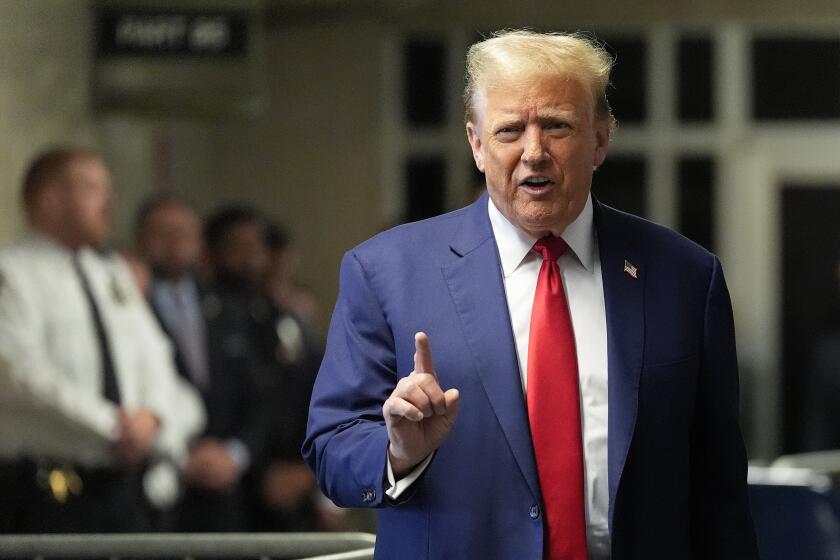Miller’s Criticism of Fed Disavowed by White House
The White House sought Friday to put distance between President Reagan and his budget director’s criticism of the Federal Reserve, saying that James C. Miller III, was speaking for himself and not for the Administration when he warned that the board was risking a recession if it raised interest rates.
Speaking with reporters on Thursday, Miller, director of the Office of Management and Budget, said in Washington that, if the Fed restricts the supply of money excessively and forces interest rates to rise rapidly, “we could be in a substantial recession a year from now.”
His remarks led White House spokesman Marlin Fitzwater to issue an official disavowal of that view, and other aides who accompanied Reagan to Santa Barbara, where the President is visiting his California ranch, suggested that Miller’s remarks were intended to limit the President’s options in the sensitive area of monetary policy. At the same time, his statements raised the risk of setting off a major dispute with Paul A. Volcker, the Fed chairman.
When asked whether Miller had been chastised for the remarks, Fitzwater replied: “He is aware of the Administration’s position.” But officials indicated that Miller’s statements had not severely disturbed the President’s senior aides.
“Jim says in that story that he is speaking personally and not for the Administration,” Fitzwater said in remarks volunteered to reporters at a daily news briefing. He added:
“The Administration feels the current course of monetary policy is appropriate.”
Ed Dale, spokesman for the budget office, said in response to Fitzwater’s statement:
“We have no comment except to emphasize that Jim was . . . warning that the Fed could do something--not that they’re doing anything now. He doesn’t retract that statement.”
Miller’s remarks were made as a number of other officials were sending out their own signals on the state of the economy and the strength of the dollar.
On Wednesday evening, Treasury Secretary James A. Baker III delivered a speech to the Japan Society in New York, warning against a decline in the dollar’s value.
“Let me make one point clear,” he said. “A further decline of the dollar against other main non-dollar currencies could very well be counterproductive to our goal of higher growth” among such key trading partners as Japan and West Germany.
‘Slow Economy’
And Martha Seger, a member of the Federal Reserve Board who does not share Volcker’s emphasis on anti-inflationary measures, said in an interview with the Wall Street Journal that “if, in the process of protecting our dollar, we tip a slow economy into a recession, that doesn’t help anybody.”
When the dollar falls against other currencies, it tends to increase inflation by driving up the prices of imported goods purchased by Americans. And, as competition from foreign producers eases, domestic manufacturers find that they can let their prices increase.
Volcker and Baker are concerned about the economic impact of inflation, but Miller worries about a recession, which would make his job more difficult by cutting down government revenues, forcing an increase in spending and increasing the federal budget deficit.
Fitzwater denied that there was disarray within the Administration and said: “The policy-making team is in good shape.”
‘Sustain Economic Growth’
He said the Administration wanted the independent Federal Reserve to “conduct monetary policy in such a way as to sustain economic growth without a resurgence of the high inflation and high interest rates that the President inherited when he first took office.”
“To suggest that the Fed is acting otherwise is not Administration policy,” he said.
“The President feels the economy is sound and on a stable, steady course,” the spokesman said.
The Administration’s forecast for 1987 inflation--3.8%--runs slightly below that of independent economists but is well above the minuscule rate of 1.1% that prevailed during 1986, when the rate was held down by tumbling oil prices.
Securities Portfolio
The Federal Reserve Board tries to influence the economy with the huge portfolio of government securities that it controls--selling securities to banks, which then have less money to lend to customers, or buying securities from the banks to make more funds available to stimulate business.
More to Read
Get the L.A. Times Politics newsletter
Deeply reported insights into legislation, politics and policy from Sacramento, Washington and beyond. In your inbox three times per week.
You may occasionally receive promotional content from the Los Angeles Times.






